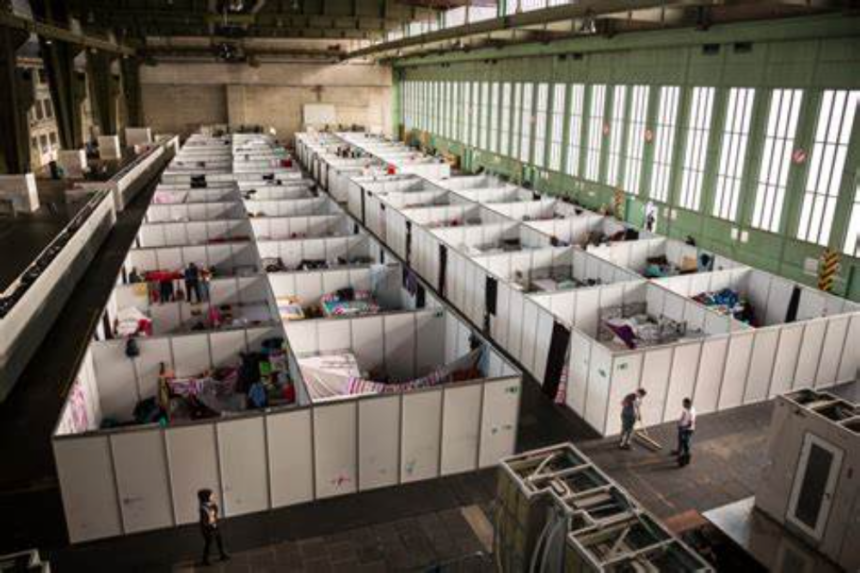The largest refugee shelter in Germany is located at the former Berlin Tegel Airport. Around 5,000 people are housed here, with approximately 2,000 available spots that may soon be filled by new arrivals.
Aleksandra, a 21-year-old refugee from Kyiv, is frustrated: “There’s still no soap in the toilets. I’ve been living here for more than six months with my two daughters, and it’s dirty. The cleaning staff don’t do a proper job. I’ve stayed in several blocks, and everywhere is unclean. It’s very noisy. People, especially the sick and disabled, are not offered alternative accommodation. This is the real issue here.”
Living Conditions: 16 People in One Cabin
In some areas, such as one particular cabin, 16 people live together with no privacy. Cooking is prohibited for fire safety reasons. The noise is constant, causing distress for many refugees, already traumatized by their past experiences. There are numerous complaints about hygiene issues as well, which the Berlin Refugee Office acknowledges as a challenge. Though efforts are being made to improve the situation, conditions remain difficult.
Approximately 5,000 refugees are accommodated in 40 cabins, most of them from Ukraine. What was initially supposed to be a temporary shelter for Ukrainian refugees has turned into a long-term emergency solution. Finding vacant apartments in Berlin is difficult, causing delays in relocation. Some refugees have been living in Tegel for nearly two years.
A City Within a City
Monika Hebbinghaus, from the State Office for Refugee Affairs, explains, “We can’t tell anyone that we have nothing; we have to accommodate everyone, as this is our legal mandate. As more people come, we have to lower our standards, which is what we are seeing here in Tegel. This isn’t our normal accommodation standard, but it happens because many people arrived in a short amount of time.”
Over the last two years, a “city within a city” has developed in Tegel, with more than 1,400 workers managing it. The shelter includes sports halls, manicure studios, cafeterias, doctors, libraries, and childcare services. Around a third of the Ukrainian refugees have found employment during their stay. However, taking care of children remains a challenge, and the emergency shelter costs the government half a billion euros annually.
“This is an extremely expensive form of accommodation because it requires intensive labor and has very high operating costs,” Hebbinghaus says. “What we spend here on electricity, heating, and rent for the halls is very high. While the standards are lower in terms of space provided, it’s the most expensive accommodation option. But we don’t have the capacity to create such spaces elsewhere in the city at this speed.”
New Arrivals Expected
Staff at Tegel receive complaints every day and are sometimes even physically attacked. They rarely hear words of appreciation. However, they are preparing for the possibility of hundreds more refugees arriving soon, potentially from Ukraine and Lebanon. Despite the challenges, they feel the accusations against them are unjust.
Meanwhile, Aleksandra is determined to take her future into her own hands. She and her husband are learning German on their own initiative because they sense they may be staying in Germany for a long time. As she says, waiting makes her sick.







